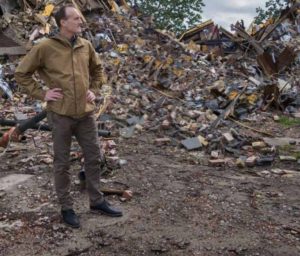Propane Explosion Lawyers Foresee Increase in Number and Severity of Explosions
The first practical fuel gas detector was invented in 1926 by Oliver Johnson, an employee of Standard Oil Company in California. It was the first reliable device that could detect combustible gasses in air, a major advancement in safety for industrial workers. Almost 100 years later, the same basic catalytic combustion sensor technology could help prevent catastrophic house explosions if more states follow the good examples being set in Maine and Illinois.
The Pritzker Hageman explosion law firm investigated the trend and continues to study it. What follows is an explanation of why apartment landlords and residential developers across the country should be required to install fuel gas detectors, especially when propane (Liquified Petroleum Gas, or LP) is used to run appliances or to heat apartments, homes and commercial spaces.
Pritzker Hageman represents families and individuals in propane explosion lawsuits. The firm, known for its ability to win complex litigation against large companies, has handled individual gas explosion lawsuits worth as much as $10 million and as large as $45 million.
In 2022, Maine adopted a state law requiring detectors where there’s a natural gas- or propane-fueled furnace or other appliance. The new law applies to an array of rental properties, businesses, hotels, motels, non-profit organizations and other shelters. The legislation followed a 2019 explosion that killed veteran Fire Captain Michael Bell when he and others were called to check on a gas odor at a new, two-story building in Farmington, Maine. Officials said a detector would have sounded an alarm before the gas leak was at a dangerous level.
Similar legislation has been introduced in Illinois. One bill would require installation of propane detectors in homes that burn the fuel to run furnaces, water heaters, clothes dryers or other appliances. Under a second bill, apartments and other rental units would be required to install a detector within 15 feet of every bedroom. Both bills are before the Illinois Senate Committee on Energy and Public Utilities.
New York and Washington are among other states where propane detectors could become mandated. In addition, installation of fuel gas detectors has become an issue in cities like Seattle, Phoenix, Chicago and New York City. Across the Atlantic Ocean, the European Union has a directive that requires all new homes to be equipped with fuel gas detectors. The directive also recommends that all existing homes be retrofitted with fuel gas detectors.
Contact the Pritzker Hageman Burn Injury Lawyers
Phone: 1-888-377-8900 | Text: 612-261-0856
Our award-winning pipeline explosion legal team handles cases for clients in every state in the country.
Explosion Burn Risk on the Rise
The Pritzker Hageman propane explosion attorneys have tracked an increase in the severity of propane explosions. The frequency of those blasts also appears ready to climb, research shows. The dual threat of increased severity of fuel gas explosions and greater frequency of those accidents is a formidable basis for new fire safety laws, Pritzker Hageman Managing Partner Eric Hageman said.
“It is tragic to see people getting injured and killed in fires that would not have occurred if landlords and building owners had taken very basic preventive steps,” Hageman said. “We will always help people fight for accountability when they have suffered terrible losses, but it is heartbreaking to see the after-effects of so much avoidable harm.”
A study published in the journal Fire Protection Research in 2022 found that the severity of propane-related fires is increasing. The study found that the average cost of a propane-related fire in the United States increased from $200,000 in 2010 to $600,000 in 2020. The study also found that the average size of a propane-related fire increased from 1,000 square feet in 2010 to 2,000 square feet in 2020. Titled “An Analysis of Propane-Related Fire Severity in the United States,’’ the study’s authors attributed the increase to an overall increase in the use of propane in buildings, the use of larger propane tanks by utility customers, and the increased use of propane in more hazardous applications. Another factor cited by experts is the relative affordability of propane as a household fuel, increasing its popularity.
According to the National Fire Protection Association, there were an average of 11,000 propane-related fires in the United States per year between 2017 and 2021. Those fires resulted in an average of 45 civilian deaths and 1,135 burn injuries per year. The clear majority of the fires occurred in residential buildings (78%).
Sue For Propane Explosion
For the past decade, LP gas usage has been relatively stable as a primary heat source in U.S. households. As such, LP directly fuels millions and millions of homes. But there are indications that a growth spurt is on the way. The same legal principles regarding liability will remain no matter how often leaks happen. The Pritzker Hageman burn injury lawyers bring years of experience to lawsuit investigations when people suffer or die from burn and blast injuries.
Accident rates may not change, but propane appliances are now produced with greater fuel efficiency, increasing their appeal among consumers. If natural gas prices continue to increase, LP’s affordability could become a new incentive for homeowners and landlords to switch from natural gas to propane.
Moreover, propane is becoming a useful backup fuel for on-site microgrids that produce power to housing complexes. When everyday energy service is disrupted, propane-powered generators are on deck to immediately restore power. Those microgrids are becoming increasingly popular as the frequency of mega-storms increases. The backup systems are especially useful in housing developments built for empty-nesters and retirees, for whom uninterrupted power is at a premium for medical equipment like breathing machines, home dialysis and electric-assist furniture.
According to Wood Mackenzie, a leading energy research group and consultancy, the residential sector only provides about 5 percent of the demand for micropower grids. However, that number could jump to 18 percent within several years and LP gas will fuel part of that growth as a backup energy source. Another reason for increased usage of microgrids and propane-powered generators? Think about future charging demands for electric vehicles. As the consultants have noted, private microgrids can use a combination of energy sources, including solar, battery storage and backup generators fueled by “low-carbon propane.”
Taken together, the expected rise in propane usage in homes, garages, apartment buildings and housing developments provides all the more reason for states and large cities to start requiring fuel gas detectors to save lives by guarding against explosions and fires. The devices can help prevent fires and explosions by detecting the presence of flammable gasses before they reach dangerous levels.
Investigating Your Case
A national study published in the journal Fire Technology in 2019 found that the most common causes of propane-related fires in residential buildings were leaks (50%), equipment malfunctions (31%), and human error (19%).

Explosion lawyer Eric Hageman investigates the site of a gas explosion.
The Pritzker Hageman gas explosion legal team investigates all circumstances to hold the propane industry accountable. Our team has uncovered improper refilling of propane tanks and other instances of negligence by suppliers. A common problem is the fading of odorant added to the gas as a safety precaution. LP is odorless unless mixed with ethyl mercaptan and the industry continues to struggle with the chronic problem of odor fade. Gas leaks shouldn’t happen, but when they do, consumers rely on odorant as a warning to escape before the fuel explodes into a fireball.
When explosions happen and people are killed or injured, a proper investigation covers an array of potential faults:
- What caused the leak?
- Was there a leaky valve or other equipment failure in the gas line?
- Did gas leak from a faulty appliance?
- Was the appliance properly manufactured and installed?
- Did the landlord equip the rental property with fuel gas detectors?
- Was the safety equipment defective?
- Did the landlord properly maintain gas lines and appliances?
- Was the property adequately ventilated?
- Was the propane tank correctly filled by the LP supplier?
- Was the employee who filled the propane tank properly trained?
- Did the supplier dispense the gas with enough odorant?
- Did contractors follow safety-related building codes during construction or remodeling?
- Was the fuel gas supplier in compliance with all safety regulations?
Talk to an Experienced Burn Injury Lawyer
Pritzker Hageman is one of the few law firms in the country with experience representing burn survivors and their families. If you or someone you love was burned in a fire or explosion, it is important to talk to a lawyer as soon as possible because laws called statutes of limitations may limit the amount of time you have to file a claim.
Contact Pritzker Hageman’s team of burn attorneys for a free consultation on what to expect from the legal process, how burn compensation is distributed, and other impacts of taking legal action.


